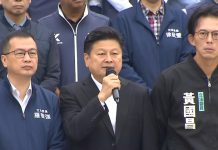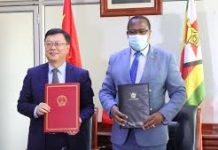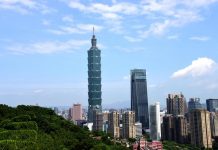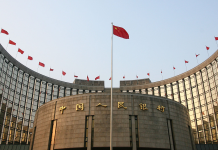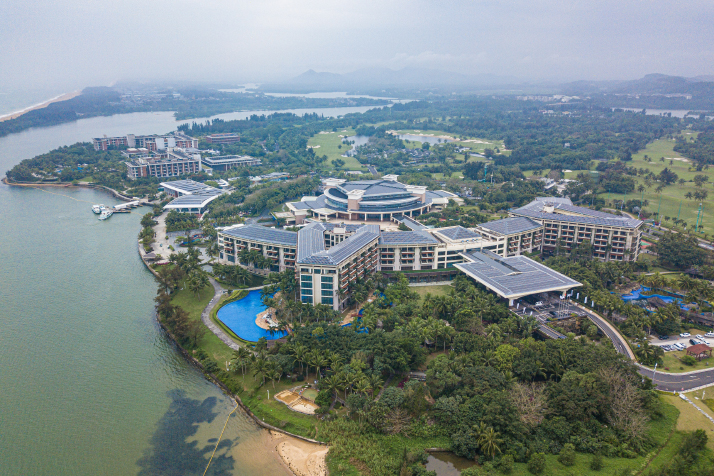
Imagine that on a remote island, half of the residents are fishermen, while the other half are fruit growers. If these two groups choose not to trade with each other, the situation becomes precarious: The fish will quickly spoil, and the fruit will rot. If they engage in trade, both parties benefit.
This is a story that Long Yongtu, former Vice Minister of Foreign Trade and Economic Cooperation and former Secretary General of the Boao Forum for Asia (BFA), shared at the BFA Annual Conference 2024, which was held from March 26 to 29 in Boao, a coastal town in China’s southernmost province of Hainan.
“Trade is mutually beneficial, allowing each country to fully utilize both domestic and international markets and resources. This enables economies to develop at lower costs and progress more rapidly,” Justin Yifu Lin, Dean of the Institute of New Structural Economics at Peking University and former Senior Vice President and Chief Economist of the World Bank, said, echoing Long’s view at the forum.
“When we talk about international trade, we inherently understand trade is a win-win situation,” Long said. “Speaking of globalization today is essentially a call to return to common sense, to revert to the most fundamental laws of nature.”
So how will globalization evolve? Where is the world economy headed? Over 2,000 guests hailing from more than 60 countries and regions gathered in Boao to find answers to these overarching questions.
Also referred to as the Asian Davos, the BFA, launched in Boao in 2001, is an annual international forum that brings together leaders from government, business and academia in Asia and other continents to discuss economic, social and political issues facing the region and the world as well. It is modeled after the World Economic Forum held every year at the Swiss mountain town of Davos.
This year’s gathering was themed Asia and the World: Common Challenges, Shared Responsibilities.
“The current global landscape is fraught with a multitude of complex challenges,” BFA Secretary General Li Baodong said at a press conference on March 26. From sluggish economic growth and tumultuous international relations to frequent natural disasters and extreme weather events, the world faces a host of obstacles that impact both development and security. The increasingly pressing need for global governance further complicates matters, exerting significant influence on the global economic and political landscape, he added.
“We hope that through discussions we can enhance the consensus that sustainable development is a common interest for all nations worldwide while unity and cooperation are the shared responsibilities of the international community,” Li said.

A return to common sense
BFA participants widely agreed that the rise of deglobalization, fragmented trade, and protectionism has currently become a major challenge facing global economic development.
Why do these issues persist, then? The primary reason is that some countries are facing internal issues such as high unemployment rates, slow economic growth and a shrinking middle class. They often scapegoat international trade, believing that these problems are caused by imported products. However, this is not the case, Lin said.
“When we return to the most basic common sense, issues surrounding globalization and fragmented trade can be resolved,” Long said.
After the COVID-19 pandemic, especially with the emergence of geopolitical issues, attention has increased toward the security of industrial chains and a global restructuring of these chains. However, it is crucial to organically link this focus on industrial chains with their efficiency and market dynamics. Otherwise, while security may be ensured, consumers, and most of all ordinary people, may ultimately bear a heavy cost, emphasized Long.
He stated that while scholars and entrepreneurs understand this matter clearly, it’s important to explain the fundamental principles and rationale of international trade to ordinary people, especially those unaware of the dangers of deglobalization, rather than resorting to the manipulative rhetoric often employed by politicians.
He then gave two examples of the potential consequences of different manufacturing strategies on costs and burdens for both Chinese companies and American consumers:
If the U.S. chooses to re-shore manufacturing to its small towns, it may face higher costs, ultimately passing the burden onto its consumers. On the other hand, if the U.S. opts for near shore outsourcing, Chinese companies would need to relocate to Mexico to obtain a certificate of origin, leading to increased costs. This shift would impose a heavy burden on both Chinese companies and ultimately consumers in the U.S. It does not bring any benefits to the U.S., Long said.
“Once we understand the most fundamental principles, we can have a correct understanding of globalization. All countries hope that their consumers can benefit from international trade. This is what a rational government should strive for,” he said.
Former U.S. Secretary of Commerce Carlos M. Gutierrez pointed out at the forum that the U.S. bears responsibility for the current trend of deglobalization. He said when people start talking about “buying American,” “bringing jobs back to America” and “how globalization is hurting us,” this initiates a political process that reduces cooperation in the international system. Today’s U.S. exemplifies this trend, he said.
Gutierrez anticipated that the upcoming presidential election in his country would likely feature inflammatory rhetoric blaming other countries like China and Mexico for job losses, with promises to protect the affected individuals.
However, he warned that in reality, protectionist measures do not effectively safeguard jobs. He emphasized that if the U.S. focuses solely on its own benefits without considering the broader implications, it will not be advantageous for the country in the long run.
“I believe we are seeing a realignment of globalization. It will be more influenced going forward by geopolitical factors as well as economic factors,” Charles Dallara, an Advisory Partner and Chairman of private markets firm Partners Group USA, told Beijing Review at the BFA. He added the U.S. has retreated into a type of “mentality protectionism” today, a narrow form of nationalism which doesn’t work in the long run for the Americans.

Where will the money flow?
“The world economy did not fully revert to pre-pandemic growth levels as expected,” Li said at the press conference. “Under superposed uncertainties, Asian economies are facing volatility, but they are also demonstrating tremendous resilience.”
According to a report released by the BFA on the Asian economic outlook and integration progress, Asia will continue to be the region contributing the most to global economic growth in 2024.
This year, the growth rate of the Asian economy is expected to reach around 4.5 percent and Asia’s GDP is poised to represent 49 percent of the world’s total, said the report. GDP matters because it is a gauge of the health and size of an economy within a given period.
The growth prospects of developing economies in Asia, including China, India, Indonesia and Saudi Arabia, look promising. And with robust resilience and immense potential, China will serve as a pivotal force for sustainable global economic development in the post-pandemic era.
David Hill, CEO of management consultancy Deloitte Asia Pacific, emphasized the importance of infrastructure. He said a government’s enthusiasm for infrastructure projects can lay a solid foundation for capital inflows. “Japan undertook the efforts decades ago, and China has been consistently pursuing such endeavors. Many other Asian countries are also following suit,” he said.
Giulio Terzariol, CEO Insurance at Generali Group, one of the largest global insurance and asset management providers, targeted sectors with enormous growth potential. Currently insurance penetration rates in China and other Asian countries are relatively low compared to the U.S. and Europe, so a huge potential for development remains, he added.
China remains highly attractive within the Asian region for foreign direct investment. Additionally, there is a great amount of capital flowing from China to other countries as well, Dallara said.
“I come here to have conversations with the Chinese Government, financial institutions and commercial partners to see how we can partner together to help the development of Kurdistan—rich in mineral resources, agriculture, oil and gas and with a growing population of young people, and how we can partner together perhaps to see progress in my region based on progress from China,” Tim Wilkinson, Ambassador at Large and Special Envoy, Office of the President, Patriotic Union of Kurdistan, Republic of Iraq, shared with Beijing Review at the BFA.
He said the Belt and Road Initiative, a China-proposed initiative to boost connectivity along and beyond the ancient Silk Road routes, is one of the reasons why he came to Boao. Kurdistan is particularly interested in the initiative’s endeavors to engage with the global community, foster relationships and contribute to international economic development.
“Entering and operating within the Chinese market remains attractive to international organizations,” he said, adding that both traditional industries and emerging technologies such as electric vehicles and artificial intelligence in China have really impressed him. “All these represent opportunities for all sorts of people, all sorts of companies and all parts of the world.”
“I think the greatest opportunity is the Chinese people,” Carl F. Fey, a professor of strategy at BI Norwegian Business School in Oslo, Norway, told Beijing Review at the BFA.
He believes that China’s lower-tier cities, like Ningbo in Zhejiang Province where he once worked, represent a significant market due to their large population, which is double that of Norway. However, these cities are often relatively unknown in the West.
“So a real opportunity is to focus on the lower-tier cities and to focus more inland,” he explained.
Comparative advantages
“Comparative advantages” appeared to be a high-frequency term at this year’s BFA conference. This concept typically refers to the unique strengths or attributes that one entity possesses in comparison to another, which can be leveraged for competitive purposes or trade considerations.
Dallara told Beijing Review that, in the end, economic strength and comparative advantage will make a difference because consumers are not going to pay for inefficient products if they have better alternatives.
“China is better at doing one thing. The U.S. is better at doing another thing. Europe is better at doing a third thing. And we should specialize in what our comparative advantage is to be the best at a certain industry activity. It’s inefficient for everyone to do the same thing. But unfortunately, this is the direction the world is moving in—if we keep increasing protectionism and continuing this trend,” Fey said.
There are possibilities to make the pie bigger and that’s what we really need to work on, he said.
“I think there probably are some benefits to having several strong countries and not one dominant country that makes sure that all other countries behave,” he added. –The Daily Mail-Beijing Review news exchange item


